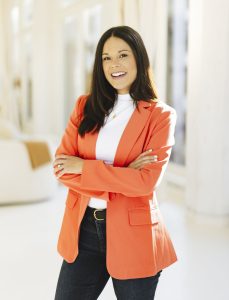 For Jenna Rogers ’19, the decision to study communication as an undergraduate was an obvious one. After studying speech communication at the University of Arizona, her father had gone on to own a small business for more than three decades. She was inspired to follow a similar path as she realized how much he enjoyed his work.
For Jenna Rogers ’19, the decision to study communication as an undergraduate was an obvious one. After studying speech communication at the University of Arizona, her father had gone on to own a small business for more than three decades. She was inspired to follow a similar path as she realized how much he enjoyed his work.
During her sophomore year at Arizona State University (ASU), Rogers took a civil communication course that opened the door to new career possibilities. It was a facet of communication she found fascinating. When ASU rolled out a certificate program in civil communication just a year later, she quickly added it to her major.
As she earned her bachelor’s degree and certificate, Rogers also held various jobs: interning for Harlem Globetrotters, teaching young girls how to water ski, drafting documents for a law firm, and serving customers at a bakery. By the time graduation arrived, she had dedicated just as many hours to working as she had to studying.
“I grew up in a biracial, bipolitical household,” says Rogers. “When I was first exposed to the study of civil communication, I realized that’s what I’d grown up around and been practicing my entire life. And through some of my work experiences as a student, I realized the impacts of poor interpersonal communication, especially when you throw it into a conference room behind paychecks, titles, and hierarchies.”
So, when it came time to wrap up her undergraduate journey with an honors thesis project, it didn’t take long for Rogers to choose her area of focus: improving workplace productivity, collaboration, and cooperation through civil dialogue.
MSC Creates an Unexpected Path to Entrepreneurship
After graduation, she moved to Chicago to start her full-time career working for a large company, but it wasn’t the positive experience she expected. This disconnect motivated her to broaden her understanding of communication in the workplace.
“The Master of Science in Communication (MSC) program was a very natural next step to do that,” she explains. A self-proclaimed “CEU,” Rogers continued to work in a corporate role by day but was an entrepreneur by night, building out the framework for what’s known today as Career Civility, her communication consulting firm.
While her business was initially a side job, losing her full-time position after the birth of her second child gave her an unexpected opportunity. “As a new mom of two, when I found myself without a corporate job, I knew it was time to put the foundation I had built to the test,” explains Rogers.
In January 2024, she took Career Civility full-time. Now, more than a year later, she’s making her first hire and watching her business grow every day. And she credits her success in part to what she learned during the MSC program:
- Applying Professor Leslie DeChurch’s advice about networking and prospecting to build her business.
- Sharing Professor Paul Arnston’s quotes on listening when she leads workshop presentations.
- Referencing Professor Randy Iden’s insights to educate organizations on communicating with people at all levels during periods of change.
- Using Professor Amy Hauenstein’s guidance to create curriculum based on adult learning styles.
“Even coursework that I didn’t think would contribute to my career is coming back around,” she explains. “I used everything I learned during the MSC program to launch my business.”
Using Communication as a Tool to Build Better Workplaces
Through Career Civility, Rogers’ mission is to help organizations use communication to create better workplaces for future generations. She does this by directing workshops, supporting employee resource groups, and guiding leadership teams through critical moments like:
- Onboarding and everboarding
- Providing and receiving feedback
- Creating cultures of productivity
- Reducing workplace conflict
She has even returned to Northwestern to lead workshops for students, staff, and faculty about building resilience and communicating burnout.
In addition to working with organizations, she also offers plenty of valuable advice for entry- and mid-level professionals through online courses and social media and newsletter content. Case in point: Every Tuesday, she posts a quick reel to share tips on crafting better emails. She dedicates Mondays to responding to questions from her followers.
As Career Civility continues to grow, Rogers envisions building a business that will meet employees wherever they are, whether that means onsite childcare, paid parental leave for men and women, or something else. “I want to build a business that offers the type of support I needed when I was working in the corporate world. I want to lead by example.”
| Read more on our blog and follow Northwestern’s Master of Science in Communication program on Instagram, Meta, and LinkedIn. |